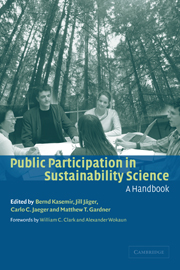Book contents
- Frontmatter
- Contents
- Notes on contributors
- Foreword: science, participation, and sustainability
- Foreword: sustainability, energy use, and public participation
- Preface
- Acknowledgments
- Part I Concepts and insights
- Introduction
- 1 Citizen participation in sustainability assessments
- 2 Contexts of citizen participation
- 3 Models as metaphors
- Part II Experiences with IA Focus Groups
- Part III Further forms of participation
- Part IV Future perspectives
- References
- Index
Introduction
Published online by Cambridge University Press: 22 September 2009
- Frontmatter
- Contents
- Notes on contributors
- Foreword: science, participation, and sustainability
- Foreword: sustainability, energy use, and public participation
- Preface
- Acknowledgments
- Part I Concepts and insights
- Introduction
- 1 Citizen participation in sustainability assessments
- 2 Contexts of citizen participation
- 3 Models as metaphors
- Part II Experiences with IA Focus Groups
- Part III Further forms of participation
- Part IV Future perspectives
- References
- Index
Summary
This first part summarizes underlying concepts and major insights of the research on public participation in sustainability science discussed in this book. In Chapter 1, Kasemir et al. argue that currently decision-making on sustainability issues in general, and climate policy in particular, is in a transition from taking first careful steps of analysis to preparing major shifts in socio-economic activities. This transition needs an improved integration of citizens' and stakeholders' views into policy making to be successful. Documented and tested participatory procedures, which integrate expert knowledge with views held by the public, are necessary. The IA Focus Group methodology, developed to address this need, is discussed, and major results concerning citizen views on climate change and energy use are summarized. In Chapter 2, Gough et al. then focus specifically on conditions for meaningful participation in such procedures. Their findings include that open-ended settings, in which both participants and moderation team steer the process together, may initially even increase scepticism, but in the longer run support the establishment of mutual trust and understanding. Also, the medium of interaction between lay publics and expertise in participatory procedures was found to be crucial. In most IA Focus Groups conducted in the research discussed in this book, computer models were an essential medium of this interaction. In Chapter 3, Jerry Ravetz suggests that such integrated models on global change issues face such high uncertainties that they can be understood to have a metaphorical rather than a predictive function.
- Type
- Chapter
- Information
- Public Participation in Sustainability ScienceA Handbook, pp. 1 - 2Publisher: Cambridge University PressPrint publication year: 2003
- 3
- Cited by



